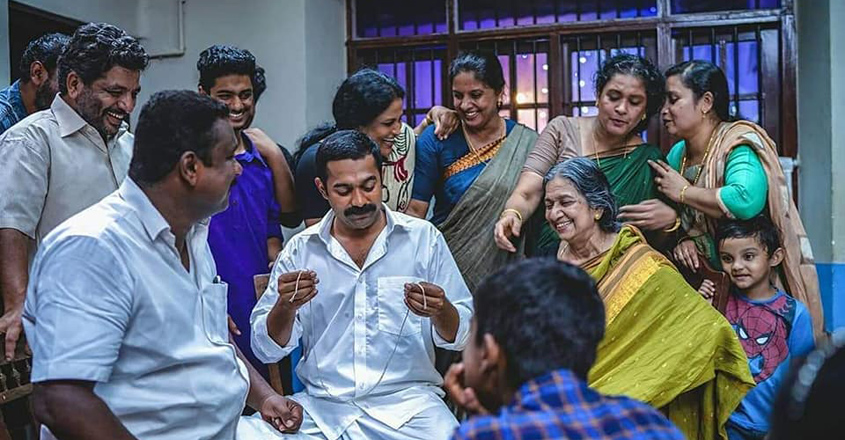Director: Nizam Basheer
Cast: Asif Ali, Veena Nandhakumar, Jaffer Idukki
Kettiyolaanu Ente Malakha has an oddly uneven soundtrack. In the opening scene, the music composer lies low. It’s a memorial service at a Church graveyard. The priest’s vague chanting of a prayer… The family and friends of the departed quietly circumambulate the grave. Further, the film moves to the backyard of the protagonist’s house where the family members indulge in casual conversations.
For the regular movie audience in Malayalam, the absence of background score in this part could be an unsettling anomaly. What are you supposed to think when there is no music to dictate your feelings? If these rural folks are leading an idyllic life why isn’t there a cheerful score to underline it?
But it’s an interesting choice. These scenes are well-staged too. The film, directed by Nizam Basheer, sticks to observing the characters, their daily existence and interactions among themselves in good details. Sleevachan (Asif Ali) gets up and leaves when his sister and mother start talking about finding a bride for him. His day begins in the wee hours in his 65-acre plantation where he goes for rubber-tapping, after which he does a breakfast of a bowl of rice gruel. He drives an old Jeep to the village centre where he shares pleasantries with the village folks who seem to be fond of him. There is an order in his life that, you see later, he is the most scared to jinx.
And then the background score starts to take over. It escalates to be the awkward clown it is in most Friday releases in Malayalam film industry. It acts as counterpoints to situations, diluting horror into bad humour, or a grey-toned emotion into monochromatic grief or excitement. Songs are forgettably mediocre. In the film’s most pivotal scene of sexual violence, the music composer decides to use a cliched tabla beat that turns it into a regular moment of goof-up in a regular Malayalam commercial movie, immediately pardoning the rapist of what he committed.
Nisam Basheer makes an effort to look at the insides of a traditional rural community without being judgemental. Women and men stick to their respective gender roles – women clean, cook and gossip, men drink, fight and negotiate. But there are also instances where they cross this line, so subtly without making a show.
If attempting a taboo theme such as marital rape itself is worth a gallantry medal, Kettiyolaanu Ente Malakha is a ready winner. Rarely has a Malayalam mainstream film taken an interest in looking at how a rural community where life is closely connected to the Church, deal with the subject of sex. Everyone knows. Everyone acknowledges. Yet, there is an invisible wall no one wants to breach.

kettiyolaanu-ente-malakha-review-4
In one of the early scenes, after catching a friend with a girl who he claims to be in love with, Sleevachan makes a fuss. He threatens to inform the girl’s father. The couple apologises profusely for being in love. There, a line is added to the scene, so subtly and smartly, to paint a good picture of Sleevachan, “You indulge in these activities because your parents aren’t careful enough. Look at me. My father was a very strict man.”
However, in the days around his wedding, Sleevachan notices a world he never knew existed. His sisters, brothers-in-law, friends, neighbours and even his mother starts to nudge him about honeymoon and physical relationship. At the pre-wedding counselling where a nun addresses a young crowd about sex, Sleevachan walks out because it makes him abnormally uncomfortable. In the wedding and post-wedding scenes, the film goes for interesting close-ups of a stressed out Sleevachan in the midst of a happy crowd dancing to cheerful music, getting themselves photographed, and relishing the feast. His trauma is something that rarely gets the attention it deserves in real and reel world.
This has to be the most Christian film to release in Malayalam in recent past, for how it uses the religious concepts of forgiveness, atonement and prayer to solve the problem of sexual violence. The emotional trauma that Rincy undergoes gets the same weight as her physical injuries – both fade away concurrently. She gets fewer shots and dialogues than Sleevachan. Her anger becomes a second fiddle to his ‘coming-of-age’, from a naive man-child to a man who has found his voice and an emotional stability.
By rendering her invisible, using romantic music and visuals, and creating a universe where Sleevachan becomes a desirable hero in an unbelievable pace, Kettiyolaanu Ente Malakha manipulates the doubting audience into cheering for the couple when they go in for an embrace and upholds the temple of marriage and family.
The film acknowledges the prevalence of marital rape in rural society in some inadequately-written scenes that look like an afterthought. A woman working in a farm tells her colleagues that in most families newly-wed women undergo rape – “I don’t have an idea how my two children were born” – and yet the society doesn’t recognise it as a matter worth concern. To set an example for the erred hero, there is a character, a neighbour, leading a gorgeous family life with a wife who pampers him and two children who are as sensitive as him. However, these sub-characters appear only as a quickly built set-up, and not an organic part of the film.
Recommended
Asif Ali is in his elements here, although his tendency to act loud creeps into his performance at times. Debutante Veena Nandhakumar delivers a fine performance in the limited space she gets, as a demure newly-wed who happily confines herself to domesticity post-wedding. The film has an excellent ensemble cast comprising of Jaffer Idukki, Basil and Manohari Joy, who is excellent as Eliyamma, Sleevachan’s mother.
Kettiyolaanu Ente Malakha excels when it is just raising a tough question. How can you solve the problem of sexual violence in a society that is afraid of the word ‘sex’? However, when it has to tie the ends together, the film turns jittery and relies on archaic ideas and cinematic tropes, instead of exploring new possibilities. This fear of falling turns it into a clinical mainstream film, sans the shine of earnestness in its opening scenes.
The Kettiyolaanu Ente Malakha review is a Silverscreen.in original article. It was not paid for or commissioned by anyone associated with the film. Silverscreen.in and its writers do not have any commercial relationship with movies that are reviewed on the site.



